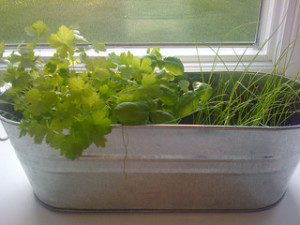Wintertime is fast approaching, which also signifies the time when planting outdoors is not a good idea anymore. If you want to still continue your planting hobby this winter season, and would like to find satisfaction from seeing your plants grow, then start checking out some of the herbs that you want to grow.
Herbs are quite manageable even during the winter season. They are not very hard to handle, and they require very little 
To help you plant and grow herbs indoors, here are the things that you have to do and remember:
- Choose Your Herbs – It is always best to go with multiple herbs, as you can use herbs to spruce up the flavor of every dish. You can choose to grow chives, mint, parsley, bay, and so much more! However, you might want to stay away from dill, because this particular herb cannot really grow during the cold weather, regardless of what you do. The nice thing about herbs is that they can be planted in the same pot. So if you have limited space in your kitchen where you intend to place your pots, nor worries! Two to three variants of herbs can share one pot.
- Choose Your Pot – Ideally, you would like to use clay pots for herbs, because clay pots can allow moisture in and out. But if you can’t find clay pots, you can always use any type of pot made of plastic or metal. Just make sure to find the ones with holes that will allow easy draining. Just make sure to cover the holes with wire mesh so that the soil will not drain with the water.
- Artificial Lighting – if you have a window in your kitchen where there is at least 6 to 8 hours of sunlight, place your pots in that place. If you have none, then you can always use artificial lighting. You can use a full spectrum light for maximum results. This type of light is available in most garden supply stores.
- Temperature – make sure that your herbs receive the right temperature. Please see details below:
- Daytime – 70 degrees F
- Nighttime – 55 degrees F
- Nurturing – make sure that your herbs receive the right amount of water. Ideally, you want to achieve a damp soil, not wet. So watering every 2 days should be good. Remove yellowing leaves too. Leaves that are turning yellow, and still attached to the main trunk will just waste the plant’s energy. You can also add fertilizers if you wish. But if you want to grow organic herbs, you can omit that part.
These are the different steps to take if you want to grow herbs indoors.
image courtesy of larryjh1234/flickr